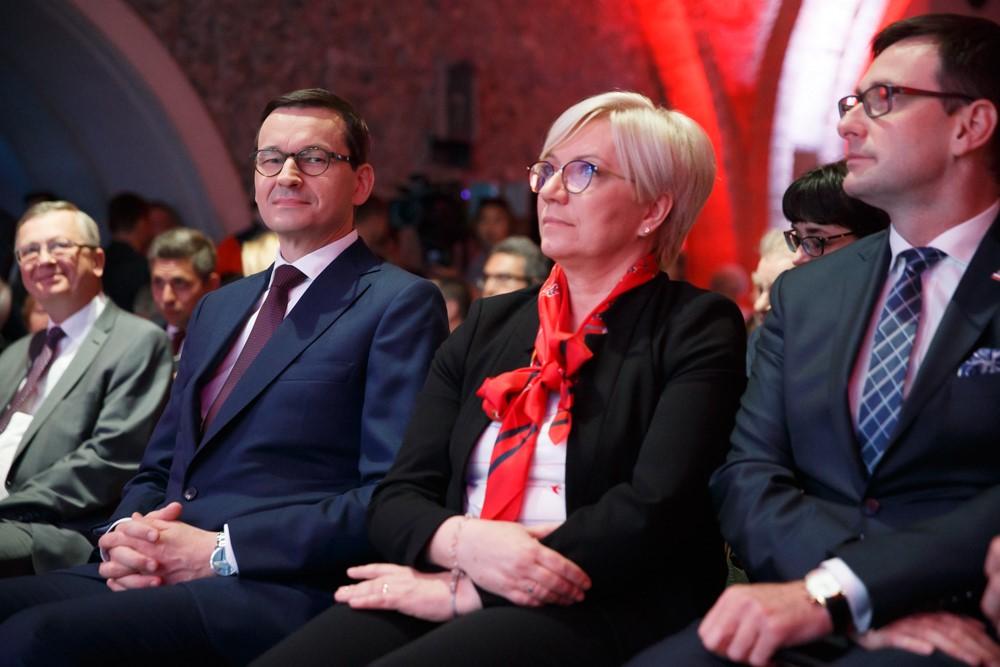Poland’s prime minister, Mateusz Morawiecki, has today appealed to a group of rebel constitutional court judges to “think about the good of Poland” and end their refusal to rule on a law intended to unlock billions of euros of European funds.
His call comes after the chief justice of the court – whose legitimacy the rebels refuse to accept – and the majority of its judges also issued an appeal to their colleagues to end their protest.
Premier Morawiecki: Mam nadzieję, że sędziowie Trybunału Konstytucyjnego, którzy nie chcą współpracować, pomyślą o dobru Polskihttps://t.co/HHw3eEDlYO
— Tygodnik Sieci (@Tygodnik_Sieci) April 28, 2023
The Constitutional Tribunal (TK) has been locked in an internal dispute since the turn of the year, when six of its 15 judges said that they no longer recognised the legitimacy of its president, Julia Przyłębska. They argue – as do many legal experts – that her term as chief justice ended in December 2022.
Przyłębska, however, denies that and says that her term lasts until 2024. The chief justice – who is a close associate of Jarosław Kaczyński, chairman of the ruling Law and Justice (PiS) party – has received backing from the government.
In March, Przyłębska saw off an attempt by the rebel judges to remove her. However, the dissenters made clear earlier this month that they will not allow a hearing to take place on a key judicial law intended to unlock billions of euros in frozen EU funds until she steps down.
A group of rebel judges on Poland’s constitutional court have written to its chief justice making clear they will not allow a hearing to take place on a key judicial law intended to unlock billions of euros in frozen EU funds until she steps down https://t.co/Fhifo90cAA
— Notes from Poland 🇵🇱 (@notesfrompoland) April 6, 2023
Speaking today, Morawiecki said that he “hopes there will be a sobering up [and] that these judges who do not want to cooperate will simply think about the good of Poland, they will think about what is more important today than various legal digressions”.
He added that he hopes the court would rule “as soon as possible” on the government’s judicial bill, so that frozen EU funds can begin to flow. The European Commission has been withholding that money until Poland meets various “milestones” to address concerns over judicial independence and the rule of law.
In February, parliament passed a bill to overhaul the disciplinary system for judges that is at the heart of the dispute with Brussels. But President Andrzej Duda then decided to refer the legislation to the TK for assessment.
Przyłębska has set a date of 30 May for a hearing on the bill to take place. However, it requires a quorum of at least 11 of the court’s 15 judges to be present. That would be impossible if the rebels refuse to take part.
The constitutional court has set 30 May as the date for a hearing on the bill to reform Poland's disciplinary system for judges, which the government hopes will unlock frozen EU funds.
However, some rebel judges on the court have indicated that they… https://t.co/PUq8Ep2l17
— Notes from Poland 🇵🇱 (@notesfrompoland) April 14, 2023
Yesterday, Przyłębska and seven of the court’s judges that support her issued an appeal for the rebels to “urgently return to participate in scheduled meetings and hearings of the full bench of the Constitutional Tribunal”, which is the “fundamental legal and ethical duty of every judge”.
The letter accused the rebels of “paralysing the work of the tribunal” and creating “anarchy in judicial activity” through “pressure, violence and even blackmail”, as well as through “slanderous media narratives”.
“We don’t have to like each other, we don’t have to be friends, but we should respect each other,” Przyłębska later told Polskie Radio.
However, in a letter from five of the rebel judges to Przyłębska – leaked earlier this week to the Do Rzeczy weekly – they made clear that they continue to “believe that not only do you not have the right to use the title of president of the Constitutional Tribunal, but you also do not have any moral grounds to assess our behaviour”.
— Krystyna Pawłowicz (@KrystPawlowicz) April 27, 2023
Main image credit: KPRM (under CC BY-NC-ND 3.0 PL)

Daniel Tilles is editor-in-chief of Notes from Poland. He has written on Polish affairs for a wide range of publications, including Foreign Policy, POLITICO Europe, EUobserver and Dziennik Gazeta Prawna.




















